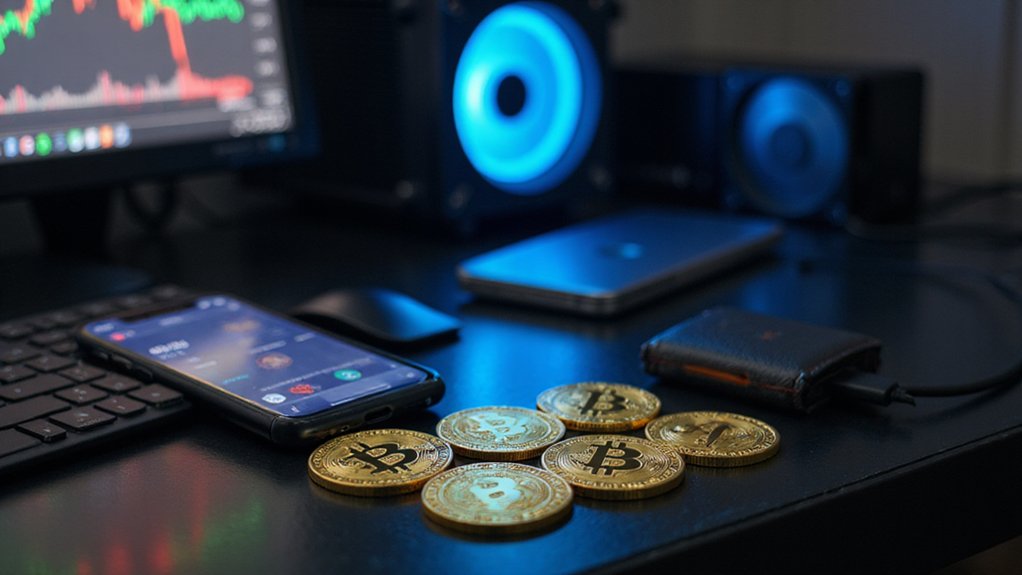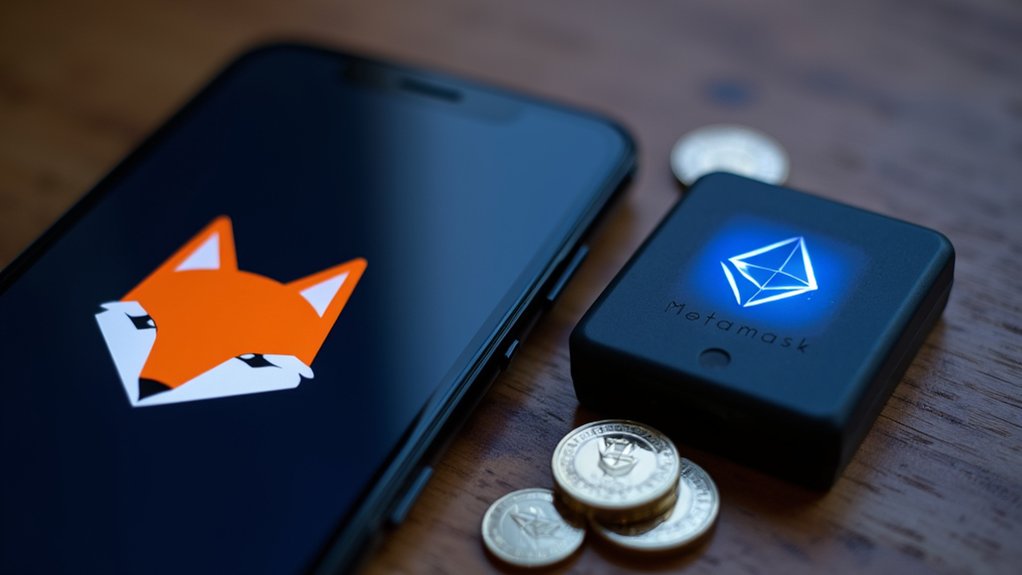Earning Bitcoin legitimately extends beyond conventional mining with its prohibitive energy costs. Enthusiasts now pursue educational incentives on platforms like Coinbase, engage with mobile gaming apps offering crypto rewards, participate in staking through DeFi platforms, and explore trading opportunities including arbitrage between exchanges. Even specialized browsers reward regular internet usage with satoshis—those microscopic Bitcoin fragments that somehow accumulate into meaningful sums. The cryptocurrency frontier remains surprisingly accessible to those willing to navigate its peculiar landscape.

Why settle for traditional investment vehicles when the digital frontier offers myriad pathways to Bitcoin acquisition?
While “winning” might suggest games of chance, acquiring Bitcoin can be more strategic than serendipitous—though both elements often coexist in this curious market.
Individuals seeking to expand their cryptocurrency portfolios can leverage several methodologies that range from passive income generation to active participation in the blockchain ecosystem.
Savvy crypto enthusiasts navigate both passive acquisition streams and ecosystem engagement to diversify their digital holdings.
Mining remains the progenital approach to Bitcoin acquisition, though its accessibility has diminished proportionally with its popularity.
Today’s miners typically deploy ASIC hardware within collective mining pools—a necessary evolution from the halcyon days when standard computers sufficed.
The energy consumption calculus (which can be prohibitive) necessitates careful consideration of operational overhead versus potential returns.
For those preferring less technical engagement, cryptocurrency platforms offer educational incentives that translate knowledge into digital assets.
Completing instructional modules on platforms like Coinbase yields modest cryptocurrency rewards—convertible to Bitcoin—essentially paying students to understand the very asset they seek.
This peculiar educational economy creates a recursive benefit: enhanced market knowledge while accumulating the asset under study.
Mobile gaming has emerged as an entertaining way to earn small amounts of cryptocurrency, with various apps offering Bitcoin rewards for completing game-related tasks or achieving certain milestones.
Staking and yielding present sophisticated avenues for the already-initiated.
By lending existing cryptocurrencies through DeFi platforms or participating in proof-of-stake validation, individuals can generate compound interest convertible to Bitcoin.
The mechanical similarity to traditional banking instruments belies the substantially different risk profile these options entail.
Crypto lending platforms provide another avenue for generating passive income without selling your Bitcoin, offering stable and predictable returns through interest earned when others borrow your digital assets.
Trading represents both the most accessible and potentially treacherous method.
Arbitrage opportunities exist between exchanges (though algorithmic traders increasingly compress these inefficiencies), while day trading demands technical analysis proficiency few genuinely possess.
Long-term holders—colloquially “HODLers”—bypass short-term volatility through strategic patience.
Finally, participation in cryptocurrency communities occasionally yields unexpected dividends through airdrops or forks.
These windfall opportunities—sometimes appearing as digital manna—require vigilance and existing cryptocurrency holdings.
Their value fluctuates wildly; yesterday’s worthless token may become tomorrow’s valuable asset (or vice versa, as many chagrined investors can attest).
Specialized browsers like Brave offer an effortless path to accumulation by rewarding users with crypto tokens simply for their regular browsing activities.
Frequently Asked Questions
Are Bitcoin Winnings Taxable?
Yes, bitcoin winnings are indeed taxable.
The IRS classifies cryptocurrency acquisitions—regardless of how they’re obtained—as taxable events.
Whether one wins bitcoins through contests, gambling platforms, or promotional giveaways, these constitute “income” under tax regulations and must be reported at fair market value when received.
Like mining rewards or staking income, bitcoin winnings fall squarely within the IRS’s ever-widening net of reportable cryptocurrency transactions.
(The notion of “winning” digital assets doesn’t, alas, win exemption from Uncle Sam’s reach.)
What Happens if I Lose My Bitcoin Wallet Password?
Losing a Bitcoin wallet password can induce the unique horror of watching one’s theoretical wealth remain tantalizingly visible yet utterly inaccessible.
Without this critical credential, the funds effectively become digital paperweights.
Recovery options include brute-force attempts (for partial password recollection), specialized recovery services utilizing GPU clusters, or—failing these—the philosophical acceptance that one has inadvertently contributed to Bitcoin’s deflationary nature by reducing the circulating supply.
Prevention, unsurprisingly, proves far simpler than cure.
How Long Does It Take to Withdraw Winnings?
Cryptocurrency withdrawal timelines vary greatly—a financial reality that often induces sighs from impatient recipients.
ACH deposits trigger holds up to 7 days, while first-time purchases face 72-hour restrictions.
Even “instant” blockchain transactions encounter network congestion, insufficient fees, or security reviews that extend processing.
Most exchanges initiate withdrawals within 24 hours, but complete settlement depends on blockchain confirmations (typically 3-6) and verification protocols.
Transactions pending beyond a day warrant support tickets, preferably before one contemplates existential withdrawal angst.
Can I Win Bitcoins Without Investing Money First?
Yes, acquiring Bitcoin without initial investment is feasible through several avenues.
Microtasks, faucets, and gaming platforms distribute small crypto rewards for completed activities, while airdrops occasionally dispense tokens gratis.
Social media engagement and testing websites similarly offer modest compensation.
Freelancing platforms present opportunities to exchange services directly for Bitcoin—though these methods typically yield minimal returns relative to time invested.
The cryptocurrency ecosystem has, perhaps surprisingly, developed multiple on-ramps that require sweat equity rather than capital.
Which Bitcoin Winning Method Has the Highest Success Rate?
Among Bitcoin acquisition methods, long-term holding demonstrates the highest success rate—with annualized returns averaging approximately 200% over the past decade.
Dollar-cost averaging similarly boasts impressive statistical outcomes by mitigating volatility’s psychological toll.
Mining, trading, and passive income strategies offer diminishing success rates respectively, hampered by increasing competition, technical barriers, and market efficiency.
The sobering reality? No method guarantees success, and each carries its unique risk profile demanding corresponding expertise.









